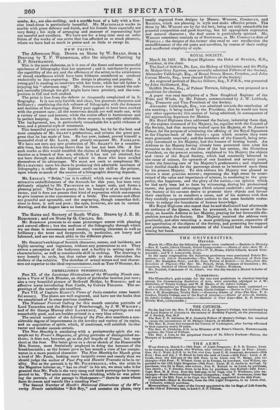ROYAL SOCIETY.
March 10, 1831. His Royal Highness the Duke of SUSSEX, President, in the chair. The Earl of Selkirk, Dr. Lee, the Bishop of Chichester, and Sir Philip de Malpas Gray Egerton, were severally admitted Fellows of the Society. Alexander Caldcleugh, Esq., of Broad Green House, Croydon, and John Carnac Morris, Esq., were elected Fellows of the Society.
An engraved portrait of Davies Gilbert, Esq.,.V.P.R.S., was presented by John Guillemard, Esq. Griffith Davies, Esq., of Palmer Terrace, Islington, was proposed as a candidate for election.
A paper was read descriptive of a New Graphical Register of the Tides and Winds, by Mr. Palmer, communicated by J. W. Lubbock, Esq., Treasurer and Vice-President of the Society. Alexander Caldcleugh, Esq., was admitted towards the conclusion of the meeting; it being stated by the President, that he would not have any other opportunity this session of being admitted, in consequence of his approaching departure for Mexico.
His Royal Highness then addressed the Society, informing them that, by the express command of his Majesty, he, together with the Council of the Society, had that morning waited upon his Majesty, at St. James's Palace, for the purpose of witnessing the affixing of the Royal Signature to the Charter-book of the Society : upon which occasion they were most graciously received ; and the members of the Council, being seve- rally introduced to his Majesty, had the honour of kissing hands. An Address to his Majesty having already been presented soon after his accession to the throne, at the close of the last session, the illustrious President, on the present occasion, explained to his Majesty the objects and views of the Royal Society, which bad constantly laboured in the cause of science, for upwards of one hundred and seventy years, under the fostering care of his Majesty's predecessors ; and expressed their dutiful thanks for the patronage about to he bestowed upon them by his present Majesty. To this address his Majesty was pleased to return a most gracious answer ; expressing the high sense he enter- tained of the value and importance of science, in conducing to the pros- perity, the happiness, and the glory of the nation,—an opinion which he had early been led to form by witnessing, during his professional career, the practical advantages which science conferred ; and assuring- the Society of his earnest desire to promote their objects and favour their exertions in so excellent a cause, and of his anxious wish that. they cordially co-operatewith other nations in the same laudable endea- vours to enlarge the boundaries of human knowledge.
His Royal Highness also stated that he and theCouncil had afterwards an audience of the Queen, when he presented, in the name of the So- ciety, an humble Address to her Majesty, praying for her favourable dis- position towards the Society. Her Majesty received the address very graciously, and after returning a most gratifying answer, expressive of her approbation of the objects of the Society, and promising her support. and protection, the several members of the Council had the honour of kissing her hand.


























 Previous page
Previous page